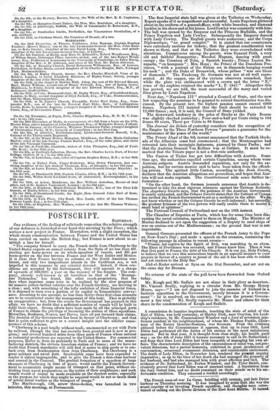POSTSCRIPT.
SATURDAY.
One evidence of the feeling of solicitude respecting the relative strength of our defences is furnished to our hand this morning by the Times; which notices a new project in France. Heretofore, with a slight exception, the Whole steam communication between France and the 'United States has been carried on under the British flag; but France is now about to es- tablish a line for herself.
"The company formed to carry the French mails from Cherbourg to the United States expects an annual subsidy from the State of no less than 401. sterling per horse-power on its whole squadron of vessels, and 48/. per horse-power on the line between France and the West Indies and Mexico. It is clear that France having no colonies on the North American con- tinent, and only two insignificant islands in the Caribbean sea, is not impelled to this measure by any colonial demand. Indeed, if these con- dilaons are accepted by the Government, they will amount to a charge of upwards of 600,000/. a year on the treasury of the Empire. The com- pany, already well-known to all travellers as that of the'Message- rice Nationales,' has found, like other coach-proprietors, that the days when immense sums were to be realized by the slow progress of its massive yellow-bellied vehicles over the French territory, are drawing to a close ; and' with something of the lofty ambition of these Imperial times, it is disposed to turn over a portion of its capital to Transatlantic convey- ance. According to one account, no leas than thirty-three first-class steamers are to be constructed under the management of this body. That is probably an exaggeration ; but, from the course the Government has pursued in this affair, we have no doubt that a sufficient number of vessels will be built to fulfil object. Strong efforts have been made by all the principal ports of France to obtain the privilege of becoming the station of these squadrons. Marseilles, Bordeaux, Nantes, and Havre, have all put forward their claims. The decision of the Government has been in favour of Cherbourg; and that fact is quite sufficient to give us a correct insight into the ulterior conse- quences of this scheme. 4‘ Cherbourg is a port totally without trade, unconnected as yet with Paris by railroad, (though the line has recently been granted and is now in pro- gress,) and several hundred miles from those parts of France whose natural or industrial productions are exported to the United States. For commercial purposes, Haire is, from its proximity to Paris and to some of the manu- facturing districts, the obvious American station of France ; and we have no doubt that French merchants will still find it easier to ship goods or to em- bark even from Southampton than from Cherbourg. But Cherbourg is a great military and naval port,. Incalculable sums have been expended to render it almost impregnable, and to give the French a first-class harbour and arsenal in the Channel. The gradual formation of a squadron of large steamers at Cherbourg in time of peace would enable the French Govern- Silent to accumulate ample means of transport on that point, without ob- truding their naval preparations on the notice of their neighbours ; and such vessels would of course be made available on the shortest notice, especially as the purpose for which they might be required wet& be not so much those of actual naval warfare as the transport of troops."
. The Marlborough, 130, screw three-decker, was launched in two minutes, this morning, at Portsmouth.
























 Previous page
Previous page